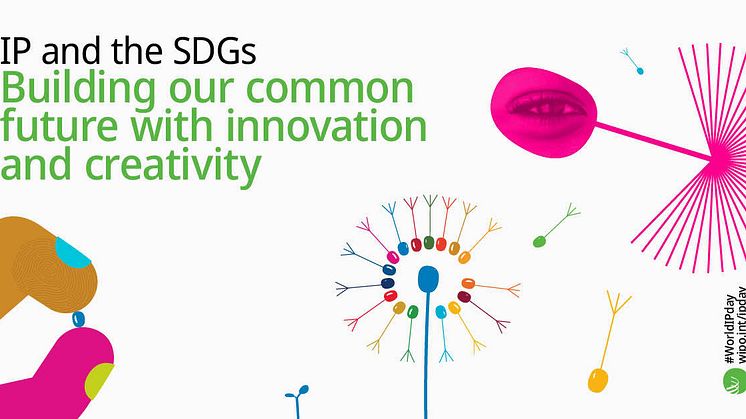
News -
The Link Between Intellectual Property and Sustainable Creativity
The World Intellectual Property Organization observes April 26 as World IP Day each year to raise awareness about intellectual property rights and the contributions that innovation and creativity make towards social and economic progress.
This year, the World IP Day theme is "IP and SDG's: Building our Common Future with Innovation and Creativity," which was announced by WIPO Director General Daren Tang to recognize the key role of the intellectual property (IP) system in helping realize the 17 Sustainable Development Goals (SDG) and building a better and more sustainable future for everyone.
That’s certainly worthwhile, and a logical extension of ingenuity and creative effort. But at the same time, another related imperative concerns the sustainability of ingenuity and creativity itself. In other words, before we can use IP to ensure the solutions for sustainability, we must first take steps to ensure the sustainability of the IP itself. In the words of the late former Chairman of the Motion Picture Association of America, Jack Valenti: “If you can’t protect what you own, then you don’t own anything.”
The United Nations’ 2030 Agenda for Sustainable Development, adopted in 2015, is underpinned by 17 sustainable development goals. At least two of these directly relate to promoting awareness and respect for intellectual property rights in the workplace. More specifically, SDG number 8.3 calls for the promotion of development-oriented policies that support creativity and innovation while SDG number 12.7 seeks to promote sustainable procurement practices.
We recently spoke with PitchMark LLP’s Legal Advisor, Frank Rittman, for his views on the matter.
Q: Why do people often ignore the importance of safeguarding creativity?
A: I think that too often we treat human creativity as a given by presuming it will always be there, standing by, ready for use by whomever or for whatever purpose, without doing enough to ensure its continued existence.
Q) Can companies knowingly or unknowingly misuse an idea or proposal submitted by vendors?
A: The procurement process is inherently precarious. It seems like everyone knows someone who, at one point or another, submitted an idea or a design or a jingle in response to a request for proposal, only to see that submission later used without their further knowledge or consent. That causes problems for everyone and casts aspersions that might be hard to overcome. Fortunately, there are relatively easy things that companies and organizations can do to minimize the likelihood of misusing someone’s intellectual property.
Q) How can a business respect vendors’ intellectual property?
A: Aside from aspiring to be good corporate citizens, a reputation for respecting other people's intellectual property rights can be a strong competitive advantage in the marketplace and provide value to a company’s operation. Conversely, a reputation for ripping off other people’s IP provides a strong disincentive for working with a company or organization. It’s said that first impressions are the strongest ones, so here again, companies and organizations need to convey the best image possible and certify their respect and use of intellectual property rights at their earliest opportunity.
Q) Can you give us an example?
A: For example, it’s a good idea at the outset to identify and properly train one or more individuals who will be explicitly responsible, and authorized, as the primary point of intake for IP submissions and the responsible steward for its internal oversight thereafter, and make that point of authority known throughout the company. Then make that individual responsible for training and educating everyone else about policies and procedures regarding the intellectual property rights of third parties. That removes the “I didn’t know” factor from the equation.
Q) Can changing the company’s culture provide a healthy environment for protecting vendors' IP rights?
A: It all relates back to creating a business environment, or a corporate culture that recognizes and values the importance of sustaining human creativity, and that starts at the top. The company or organization’s directors and senior management all need to buy into the ethos of doing the right thing and not ripping people off. Once that mindset is entrenched, the details for its implementation can be more easily identified and adapted as necessary.
Q:) So how does all of this relate back to World IP Day?
A: Well, I think it’s a different take on the same theme. Sure, we can and should encourage sustainable development through the applied use of intellectual property. But that means protecting and respecting it, rather than abandoning or dismissing it and unfortunately the United Nations may be at odds with itself on this one. For example, it was short-sighted and ill-advised, in my opinion, for UN Secretary-General Guterres to have characterized “intellectual property constraints” as an “obstacle” to knowledge sharing and technological transfer during his State of the Global Climate 2021 Report. Many would argue that IP actually enables (rather than prohibits) knowledge sharing and technological transfer. That was proven during the global COVID-19 vaccination efforts when IP rights provided the certainty and stability to enable more than 300 voluntary licensing agreements for the local manufacture of vaccines around the world. Suggesting that IP rights are a hindrance to our greater good is hogwash in my view. So, to answer your question, before we start using IP rights to sustain the planet, we have to do everything we can to sustain IP rights in the first place. And the UN seemed to recognize that at least twice in the presentation of its 2030 Agenda for Sustainable Development. We risk losing creativity altogether if we don’t do anything to protect it.
PitchMark helps innovators deter idea theft, so that third parties that they share their idea with get the idea but don’t take it. Visit PitchMark.net and register for free as a PitchMark member today.


